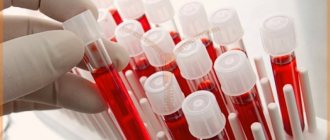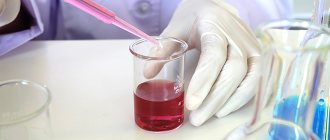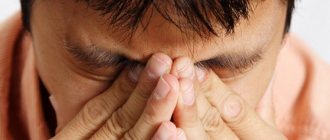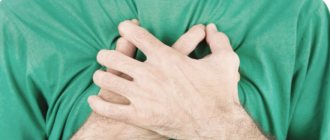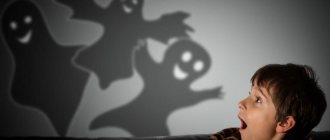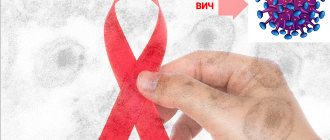Hormones play a significant, fundamental role in the human body. They are produced by the endocrine glands and enter the blood. Then they bind to the receptors of target cells and affect metabolism and other body functions.
There are several hormones that affect our mood, behavior and well-being. Moreover, each has “its own sphere of activity,” responsible for happiness, unbridled joy, love and affection, anger and fear, aggressiveness and courage.
When considering emotions such as fear, anger, anger and courage, it should be noted that a separate hormone is responsible for each.
Adrenalin
Our body reacts to stressful situations, danger and anxious uncertainty by releasing a large amount of a substance called adrenaline into the blood - the hormone of fear and anxiety.
After such a hormonal “explosion,” complex motivational processes are launched, the mechanism of which involves influencing certain centers in the cerebral cortex. The end result will be an increase in the body's ability to cope with extreme situations, and in some cases, to survive.
The external signs of a frightened person are known firsthand to everyone:
- dilated pupils (hence the expression “fear has big eyes”);
- pale face;
- shaking hands and chin (especially noticeable in children and adolescents);
- sometimes, with severe fear, stupor may occur - a person cannot move for some time;
- relaxation of the intestines (“bear disease”).
Phenylethylamine and love
Love at first sight really does exist. A sudden feeling of sympathy, sexual desire and emotional uplift in a person is caused by the hormone phenylethylamine, which belongs to the group of neurotransmitters. The release of this substance into the blood, as a rule, occurs along with the effects of serotonin and dopamine on the body. This is precisely what explains holiday romances: short-term, accidental loves often arise against the backdrop of a festive mood, characteristic of people spending their holidays in unusually comfortable surroundings.
Source: depositphotos.com
Basic mechanisms of action of adrenaline
- Increased blood pressure and dilation of brain vessels. This allows for better nutrition of the brain, which speeds up thought processes and information processing, sharpening the perception of irritating factors.
- The production of cortisol is stimulated, which improves the processes of blood saturation with substances necessary to alleviate mental and physical stress. Metabolism is significantly accelerated.
- There is a significant increase in heart rate, breathing rate increases and its depth changes.
- Blood clotting increases as a response to life-threatening stress.
In this way, the body mobilizes all its defenses to fight the irritating factor that causes fear. After some time, a feeling similar to euphoria arises. Cigarettes, alcohol and some drugs have a similar effect.
Also, this state of the body is familiar to those who expose themselves to stressful loads - in particular, dousing them with cold water. Adrenaline is also released into the blood and gives a feeling of vigor.
But any interference in the body’s functioning and forcible stimulation of adrenaline production is fraught with consequences. A state of adrenaline dependence may occur, because adrenaline is an adaptogen. Ultimately, the body becomes completely worn out and is unable to adequately respond to emergency situations.
Dependence on the amount of hormone
Excited about upcoming events, the body promotes the production of adrenaline. As a result, the hormone tones the functioning of the body’s systems: respiratory, digestive, and nervous. Organ cells and skin receive an impulse for renewal. Hence the tonic effect. There is an increase in vigor, which is compared to euphoria.
In the 20th century, scientists developed the medical concept of adrenaline addiction. This concept refers to people who deliberately try to produce a fear hormone in the blood in order to gain a surge of strength and joy. To do this, he does unexpected things that involve risking his life.
But you don’t have to participate in extreme situations to experience the effects of a new dose of fear hormone. Adrenaline is released not only during danger, but also in a stressful situation.
Doctors recommend dousing yourself with cold water, which is as invigorating as running away from an angry dog, lion or tiger. Regular douches promote uniform production of the invigorating hormone.
After pouring cold water in the morning, the supply of energy lasts throughout the day. When a person gets used to the procedure, the reserve of strength and vigor decreases over time. As a result, the interval will last literally 2–3 minutes.
It should be remembered that a strong release of the fear hormone provokes wear and tear of the body. That is why stimulation of a stressful situation has a bad effect on the body, leading to illness and sometimes death.
Norepinephrine
The precursor to adrenaline is the hormone norepinephrine, which is responsible for strong emotions such as rage and anger. The anger hormone is released into the blood in almost the same situations as the hormone that causes fear. But it works a little differently.
- A person turns red due to vasoconstriction and increased blood pressure.
- The pupils do not dilate, but rather narrow slightly.
- Muscles tense, hands clenched into fists.
- A person experiences a feeling of slight dizziness and a certain “foggy” state when the desire to destroy, beat, and rage in response to a stressful situation prevails.
All these manifestations are attributed to norepinephrine, but it must be considered in combination with adrenaline. After all, its effect, although stronger, is on certain systems, shorter in terms of the time factor. After the release of norepinephrine, adrenaline immediately comes into play.
It is the percentage of these two hormones that will determine the reaction to stress - cowardly or aggressive. After all, norepinephrine plays a significant role in a person’s state of wakefulness, concentrating attention and improving reactions. The type of response to the stimulus depends on its higher concentration.
It has been proven that the ratio of adrenaline and epinephrine, which is released by the adrenal cortex during stress, is a physiologically determined value. So it can be argued that cowardice is an innate character trait.
However, there is no need to despair, as courage can be developed. It’s just that this state comes easily and naturally to some, while others have to work on themselves. This is something similar to the effect of training, when a person works hard to achieve a result and achieves it with his desire and diligence.
Types of fear
There are 2 types of reaction to danger:
- active – at the same time the body’s defenses are manifested, a storm of emotions overwhelms: stress, panic, fear, anger. And a person’s physical capabilities increase. For example, during an adrenaline rush, a person is capable of doing things that are, in principle, unusual for him: lifting really heavy things, running a long distance in a short time, jumping over a high barrier. All attempts to repeat the same in a state of calm naturally lead to failure;
- passive - the reaction occurs unconsciously when the person himself tries to leave and hide from danger. For example, children often hide in the closet or under the bed.
The fact is that adrenaline is produced, which activates protective properties and helps the body use all resources. This helps a person avoid threats.
Each person will experience fear differently. Scientists suggest that this is due to a person’s experience and individual characteristics.
Testosterone
Testosterone, unlike adrenaline and norepinephrine, is always present in the human body in certain concentrations. If the previous hormones are released only in stressful situations and during times of danger, causing anger reactions, then testosterone is responsible for masculinity.
Physiologically, thanks to the male sex hormone, secreted mainly by the testes, a man acquires the following qualities:
- low timbre of voice;
- hair on the face, back and chest;
- developed muscles;
- wide shoulder girdle and narrow pelvis.
In addition, sexual desire and the possibility of conception depend on the amount of testosterone. But the matter is not limited to these qualities.
This hormone shapes the character according to the so-called “male type”:
- Some aggressiveness of behavior, which concerns sharpness and decisiveness in making decisions of any nature.
- Desire for leadership and aggressive moods, both in work and in other areas of life.
- Determination and courage, sometimes forcing you to do unjustified actions (especially at the time of youthful maximalism).
- The ability to face both victories and defeats with dignity.
The level of testosterone, in contrast to the level of adrenaline and norepinephrine, can be adjusted more effectively and quickly than character education and the development of willpower by emotional and volitional means. The hormone of courage is inextricably linked with the hormones of fear and rage. By raising testosterone levels, a man significantly influences his character and ability to adequately respond to stressful situations.
Emotions and hormones
FEAR is the hormone adrenaline
The biochemical effect of adrenaline is vasoconstriction. If the vessels narrow, ischemia or insufficient blood flow occurs (when the vessel is narrowed and there is little blood). The main symptom of ischemia is pain. Any pain in the body is fear. My head hurts, my stomach hurts, my legs hurt, and all that hurts is fear. Infertility is a lack of blood flow and it is also about fear.
ANGER - the hormone norepinephrine
The biochemical effect of norepinephrine is the flow of blood to the muscles in order to escape or repel an attack from an opponent.
SAD - the hormone melatonin
The pineal gland produces melatonin at night when we are not moving, when we are sleeping. Remember how you cry when no one sees you. You lie down, close your eyes and cry into your pillow - melatonin is produced. Seasonal depression occurs when sunlight becomes scarce. We get up for work - it’s dark, we come home from work - it’s dark, but we move little, a lot of melatonin is produced and we all walk around in sadness.
JOY - the hormone serotonin
Serotonin is a derivative of melatonin. The more we slept, the greater our sadness, the more joy we have, the more serotonin, the higher our life potential. If you suppress your sadness, then automatically you suppress your joy. If we do not allow ourselves to be sad, we automatically do not allow ourselves to rejoice. If we sleep well and deeply, then in the morning we will have high levels of serotonin. What you need to do for melatonin to turn into serotonin: you need to turn on bright lights early in the morning, in all rooms (I’m talking about winter - the fight against seasonal depression), turn on very upbeat music and start moving, do a few simple exercises: raise your arms up and start lifting knees higher than 90 degrees and smile. This will provide you with the production of serotonin, which means joy for the whole day. And if you are sad and want to cry, do not deny yourself this: turn off the light, lie down and cry properly for 10-15 minutes, let the tears flow, because when tears flow in a stream, endorphins are produced compensatoryly. Endorphins are released in our brain; these are our internal opioids, analogues of heroin, morphine, this is our high, an internal drug. Endogenous opioids give us a feeling of hope that everything will be fine.
ATTRACTION (sexual)
This is the most life-affirming emotion because it leads us to procreation. There is a storm of hormones here. Therefore, lovers are ready to move mountains, ready to change everything in life, energy splashes over the edge. During this period, men and women produce a lot of hormones, more than in the normal state. Women have estrogens, men have androgens. Women have capulins (pheromones), men have the male pheromone androstadienone. A large amount of pheromones are produced in women in the middle of the cycle and during this period women are most attractive to men. Women secrete their capulins through vaginal secretions and sweat. Men also release their pheromones through sweat and sperm. During the period of desire, we turn on endogenous opioids (our drugs), endorphins and ankephalins, all of which cause a feeling of complete euphoria. These substances have an analgesic effect and therefore lovers do not feel mental pain and they are poorly sensitive to the pain of other people because they are high. Finylethylamine causes a feeling of attraction to a specific person. With short-term visual contact, when something childhood from memory is updated, we “fall” for a specific person. When his name is mentioned, when he is remembered, when he looks at a photograph, when he hears his voice, a huge amount of phenylethylamine is released. This continues during the period of intense love for up to three years. Dopamine is responsible for motor activity, cognitive activity, a person becomes interested, life becomes rich. And this whole storm of hormones occurs when a person experiences ATTRACTION. But this happens not only with sexual attraction, all the same biochemical processes, but to a lesser extent occur when we have a GOAL. A person is just as involved, he cannot stop, he needs to eat less, this is justified chemically - serotonin and dopamine satisfy needs, during this period there are no unfulfilled needs, he wants to move more, more strength and energy appear. Therefore, attraction in a broad sense is the desire to do something. Girls who are currently suffering from a breakup, replace the attraction to your lover with attraction to the goal. Why are you drawn to him, are you on all these hormones? You will get the same “drugs” if you set a goal for yourself.
DISGUST - acetylcholine
Activates the vagus, the cranial vagus nerve, which is responsible for vigorous salivation in order to vomit. If you suppress fear, anger is actualized; if you suppress anger, sadness is actualized; if you suppress sadness, disgust is actualized.
LOVE is the hormone oxytocin
There is also a hormone called prolactin, which is responsible for attachment. A woman has a lot of prolactin when she breastfeeds. Due to the fact that she breastfeeds, she develops a maternal instinct. If a woman produces milk before giving birth, she is already attached and loves the child, and if she has poor lactation, they have less maternal instinct and less attachment to the child. Oxytocin is released in both women and men. It is released during caresses, during times when people cover up their needs, during an erection in men, not during sexual intercourse, but before. Oxytocin is also produced when a woman gives birth, when the uterus contracts and the uterus contracts during orgasm. That's why love and sex are connected and linked for us. Oxytocin is a hormone that also affects our sense of trust in a person.
RESULT
It's not really a feeling, it's a behavioral manipulative response. Resentment is a cocktail of feelings: sadness, anger, desire - the desire for a person to satisfy our need and if he does not satisfy, then the desire for revenge appears. When a person is offended, he releases melatonin (sadness), norepinephrine (anger) and attraction, desire - this is the storm of hormones that I wrote above. Imagine all this tied to one person. Imagine how delicious it is to be offended! What a thrill! And if we succeed, then our need will also be satisfied, and this is oxytocin. It is simply impossible to get off this needle. This is 5-6 years of personal therapy.
GREED, GUILT, SHAME, JEALOUSY, ENVY
All of them are also not pure emotions, they are behavioral composite cocktails. For example greed: fear, sadness and desire. Jealousy: anger, sadness, attraction. At the biochemical level, jealousy and resentment are one and the same. Jealousy and resentment are the idea that a partner owes me something (to remain faithful, to keep agreements, etc.) Resentment and jealousy are a manipulative reaction. Envy and greed are the same thing in biochemistry. I divide greed into greed and stinginess. When a person has accumulated a lot of emotions and he does not want to part with them, with old ideas, with old feelings - this is greed, and on the physical level this is constipation and varicose veins. What are varicose veins? Arteries bring blood to the body and the body lives and experiences joy (serotonin), all diseases associated with arteries are a blockage of joy. Veins carry waste blood back to saturate it with oxygen. And when the veins stagnate, this is varicose veins. The veins expand, there are no valves to return the blood, and the waste, unnecessary blood sits and goes nowhere. This means that the person’s mechanism for releasing the old does not work. Cannot recognize his old strategies as ineffective. Therefore, walk more, move, raise your legs above your head. For the body this is new, unreal and it will be a treatment. Greed is about any accumulation, starting from ordinary obesity, swelling, ending with fibroids, fibromas, lipomas, any benign formations. Everything that is stagnant in the body, everything that is unnecessary and excessive, everything that the body does not need is all about greed. Guilt is also an emotional and behavioral reaction. Guilt is designed to compensate for the damage caused. Guilt and shame are different. Shame is when we have done something socially unacceptable. We blush to show someone that we know that we are doing something inappropriate, but if no one knew about it and I wasn’t caught or seen, then we would do the same thing, but without blushing . Guilt is an emotional complex that helps compensate for the damage caused to another person. In the next article I will reveal the symbolism of psychosomatics. And you yourself will be able to determine your mental problems by illness.
Signs of adrenaline release into the blood
Every person can find out that the hormone responsible for fear is present in the blood by external signs. Usually they are clearly expressed, they can be observed in moments of fear, stress, when you have to quickly react to a non-dangerous and changing situation.
The release of adrenaline into the blood is accompanied by the following symptoms:
- increased heart rate;
- dilated pupils even when a person is in a bright room;
- improvement of blood clotting indicators;
- dilation of blood vessels located in the brain;
- trembling of the limbs (fingers), jaw tremor;
- constriction of blood vessels in the mucous membranes, skin, and abdominal cavity;
- involuntary defecation.
Stress hormone - cortisol
The mechanism of fear formation does not end there. Under the influence of adrenaline, cortisol in the blood, or stress hormone, increases. An increase in the levels of this substance leads to the following symptoms:
- cardiopalmus;
- sweating;
- dry mouth;
- frequent shallow breathing.
When they say “the hair stood on end,” they mean that it was very scary. Does this really happen when a person is afraid of something? Indeed, science knows of isolated cases of such a reaction during times of danger - at the roots, the hair rises slightly due to the influence of hormones. Researchers have suggested that this reaction is a reflex - for example, birds fluff up their feathers, and some mammals release spines when life is in danger. But if such actions can really save the life of animals, then in humans such a reaction is only a primitive instinct of self-preservation.
Reasons for the increase
Scientists note several conditions in which elevated cortisol is considered normal.
It is important to take these features of the body into account when analyzing hormonal status and diagnosing painful conditions:
- Working women with children often experience a second daily surge of cortisol in the evening. This is due to the need to attend to family matters after work.
- Cortisol production in men usually decreases in the evening. A change in the normal curve is observed during night work: peak cortisol production occurs in the evening, and decreases in the morning.
- In women during pregnancy, it is considered normal to exceed the levels by 2 or even 5 times. The most intense production of cortisol occurs in the third trimester.
- At the time of any injury, infection, or surgery, there is a surge in the production of stress hormones. This increase is physiological and does not harm health.
Typically, a few hours after the shock, the half-life of cortisol occurs. Its excess is excreted in the urine, and the indicators return to normal.
The cause of constantly high cortisol production may be the following diseases of the internal organs:
- pituitary adenoma;
- thyroid cancer;
- adrenal tumors;
- lungs' cancer.
High cortisol is recorded after long-term treatment with medications from the glucocorticoid group. The same condition can be triggered by prolonged stress, anorexia or prolonged depression. In turn, excess cortisol circulating throughout the body greatly exhausts organs and systems, depletes the psyche, leads to weakness, apathy, aggravating the physical condition.
Anxiety: Decreased Estrogen
Estrogen is the primary sex hormone in women and helps the brain and body produce beta-endorphins and serotonin, which are essential for maintaining a positive mood. In addition, estrogen helps achieve a balance between dopamine and norepinephrine. If this hormone is too low, not only outbursts of anger may appear, but also increased anxiety and stress. All this will only complicate the task of restoring the normal state of the body.
Methods for normalizing hormones
The concentration of any hormone is determined by standards. Hormonal imbalance over a long period can lead to the development of dangerous conditions . Lack and excess of norepinephrine causes dysfunction of internal organs.
There are natural and medicinal methods to regulate norepinephrine concentrations. Certain foods rich in tyrosine - seafood, cheese, cottage cheese, legumes, chicken and eggs, chocolate - will help normalize hormone levels. Night sleep and timely rest have a beneficial effect on hormone secretion.
When treating norepinephrine deficiency, antidepressants are used or hormone replacement therapy is prescribed. The drug Norepinephrine is administered intravenously, and the dose is determined by the doctor.
Indications for the use of a hormonal drug are:
- situations when stimulation of the heart is necessary;
- during surgery, when the patient’s blood pressure drops sharply and the pulse disappears.
Natural and medicinal methods are used to regulate hormone concentrations. Norepinephrine and adrenaline are closely related and are a powerful protective mechanism.
How to reduce the fear hormone?
Fear hormones are harmful to humans if they have a long-term effect on the body, wearing it out and leading to hormonal imbalance in general. To learn how to control the level and production of these biologically active substances, you should:
- Seek help from a specialist and take sedatives as prescribed.
- Learn to distract yourself from stress, for example, go swimming or introduce a rule of walking in the fresh air.
- Find a creative hobby.
- Use aromatherapy (baths, fumigation) with essential oils, a low-fat diet, take vitamins and herbal teas, which have a beneficial effect on your state of mind.
